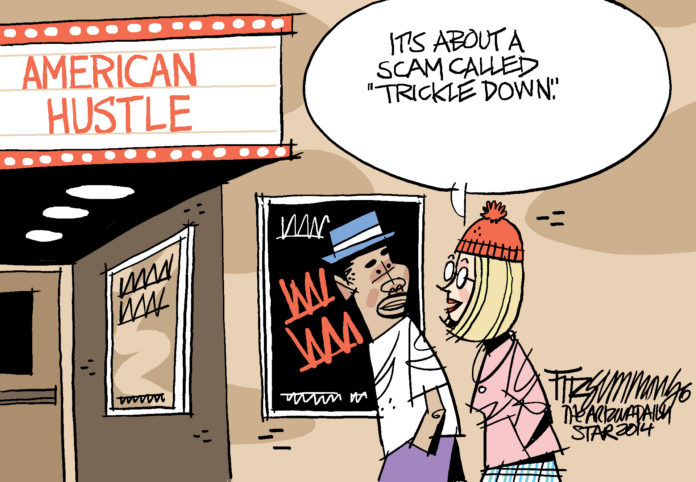BY VERN TURNER
 For the last few years, world politics has been fraught with extremists pulling and tugging at one another for some sort of dominance and control over money, religion, people and government. History shows us that there is a thread of connection between today’s extremism and earlier times. An entire book is necessary to cover all the topics in adequate detail, so this piece will look at two schools of economics and their results.
For the last few years, world politics has been fraught with extremists pulling and tugging at one another for some sort of dominance and control over money, religion, people and government. History shows us that there is a thread of connection between today’s extremism and earlier times. An entire book is necessary to cover all the topics in adequate detail, so this piece will look at two schools of economics and their results.
The neoliberal school of economics is the invention of Milton Friedman and his University of Chicago School of Economics brethren. This school of thought embraces total free-market societies where the corporation/business is king.
There are no regulations to speak of in Friedman’s world, nor are there labor unions. There is no government safety net for the citizens; they are on their own. Schools are privately owned. Health care is strictly private.
Government spending on infrastructure is only by absolute necessity and taxes – especially on business – are low or non-existent. The government owns and regulates virtually nothing including banks which are left to manage the currency and monetary policies of a nation with impunity.
In short, this is ultimate capitalism.
This particular form of extremism, aka, Supply-Side or Trickle-Down economics, is predicated on the corporation creating the jobs and wages necessary to compete in every marketplace no matter how large or small. The results of this “philosophy” show consistent results and include some disturbing outcomes.
In partnership with the CIA, the IMF and the World Bank, the “shock doctrine,” necessary to overturn economic practices in governments, was engineered by the above groups to not only overthrow duly elected governments, but to create enough social instability such that these draconian measures of change [Supply-Side economics] could be put in place without the general citizenry having any say in the matter.
This seems more than a little egregious since the implementation of “Supply-Side” strictures virtually destroys the working classes’ hopes and dreams. At the same time, the bureaucrats bought up the previously federalized businesses and industries and made huge profits. The elite classes of the effected countries did very well, while everyone else fell into abject poverty. Any social support or retirement services were banned and the cash distributed to the new “governors.”
Naomi Klein’s book, Shock Doctrine, uses many illustrations for the above summary. She highlights how Friedman’s trained advocates at the University of Chicago [and himself] pushed this doctrine in Chile [Pinochet’s coup], Argentina, Brazil, Poland, South Africa, China and even Russia after the collapse of the Soviet Union.
In each case, major “shocking” social upheavals or events created the opening for governments to employ the “Chicago Boys’” methods to make a few people very rich.
It was especially egregious in Poland and South Africa where so much idealistic revolutionary promise went glimmering due to the leverage from international money “managers” at the IMF and World Bank.
In the end, the rich got richer and the poor suffered worse deprivations than before from the extremist economic policies of Milton Friedman [Nobel Prize in Economics].
In view of the number of people affected negatively by this activity, I would say that it failed. It didn’t fail for the banks, the corporatists or the rich investors. It failed for the people of those nations who didn’t pay enough attention to what was being done to them.
Sound familiar? Even Margaret Thatcher was able to cut deeply into the social services fabric of Great Britain while conducting the Falkland Islands war. Clever those conservative politicians …
The opposite extreme from neoliberal economics is Communism. The biggest complaint about Communism is that it doesn’t allow rich people to stay rich and limits the wealth of those in power.
Karl Marx created this philosophy, but also included warnings. He warned against a perpetual governing state, too; his utopia was having the human population act as a giant collective to support everyone including freedom from want, easy access to health care and education, and purposeful, dignified work for everyone.
As with many of Marx’s theories, this ideal didn’t work out too well. He also predicted that capitalism would destroy itself from within if it became unregulated. Clearly, Marx’s idea of communism has failed. No communist country every approached the ultimate goal of government of the proletariat.
There is a common thread between these two extremes: Dictatorships. In each case mentioned in Latin America, the Soviet Union and Mao’s China, a dictator or small, strong central government was necessary to implement and maintain either of these two economic extremes. History continues to show us that these extreme economic methods fail, mostly because too many people are so negatively affected by the extremism itself.
Today, in the United States, there is a continuing battle of extremes or, more correctly, a battle between one political entity that is becoming increasingly extreme and gravitating toward the Friedman school of thought, and the opposing force of moderation and balance between social services, taxation and favorable business climates.
As the Republican Party keeps sliding to the right, it drags the rest of the ideologues to the right also. That’s why the middle class of the United States has been reduced so greatly in recent decades.
Ever since the Reagan Administration embraced Supply-Side economics, the middle class, unions, social services and public education have been under assault by our government. Add to that the curious desire to privatize Social Security and you have a virtual blueprint for the Friedman-esque extremism that has failed around the world.
I think capitalists just can’t help it. That’s why there MUST be regulations on greed. Deregulate a banking system [1999 repeal of Glass-Steagall] and bankers gamble with everyone’s money. Destroy a labor union and workers no longer can afford the consumer goods that keep a consumer economy going strong. Cut education funding and the quality of educators and curriculum plummets.
There simply must be a moderated approach to wealth, the ability to gain it and at the same time more respect for the people in society who tried to be great.
– Vern Turner is a regular contributor to The Oklahoma Observer. He lives in Marble Falls, TX, where he writes a column for the River Cities Daily Tribune. He is the author of three books – A Worm in the Apple: The Inside Story of Public Schools, The Voters Guide to National Salvation and Killing the Dream: America’s Flirtation With Third World Status – all available through Amazon.com.








